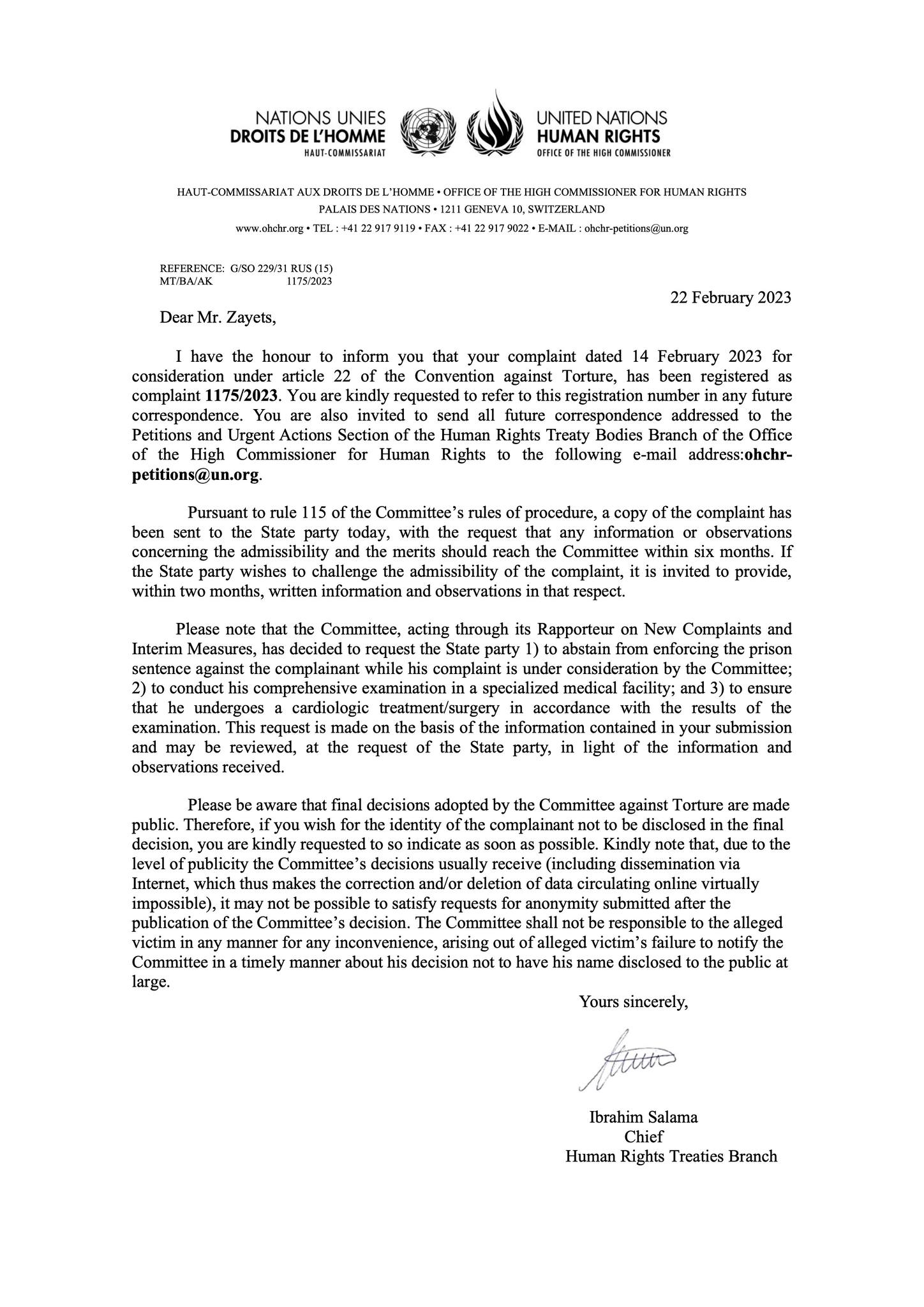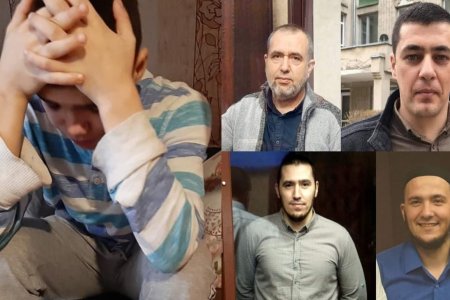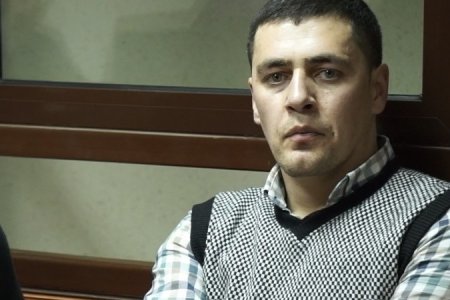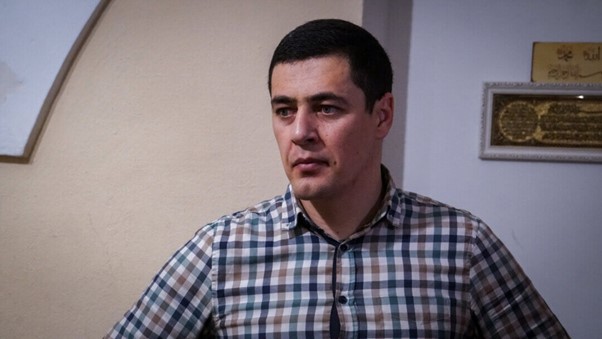
The United Nations Committee against Torture [CAT] has issued a vital interim decision, calling upon Russia to abstain from implementing a prison sentence that will certainly result in the death of Crimean Tatar civic journalist and political prisoner Amet Suleimanov. It also asks Russia to ensure that Suleimanov receive a comprehensive medical examination in a specialized medical facility and that he undergo heart surgery and/or treatment in accordance with the results of the examination. Russia has a long track record of flouting calls from UN and other international bodies. This time, however, failure to comply will almost certainly result in Suleimanov not surviving even the journey to the Russian prison colony and will come less than a month after Russia directly caused the death of another Crimean Tatar political prisoner Dzhemil Gafarov.
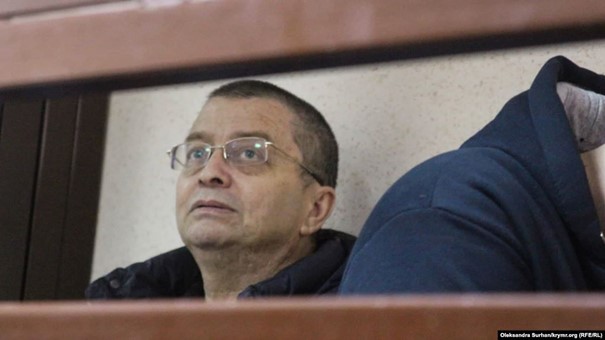
The Head of the UN Treaties Branch of the UN Human Rights Committee responded on 22 February 2023 to an appeal from Suleimanov’s lawyer, Serhiy Zayets. The latter had filed a complaint on 14 February, asking that CAT consider this under Article 22 of the Convention against Torture and Other Cruel, Inhuman or Degrading Treatment or Punishment. This enables victims of a violation of the Convention or, in this case, their legal representative, to request that CAT intervene and communicate with the state party, here, Russia. The Committee has done so, registering the complaint as No. 1175/2023, and applying the above-listed interim measures. Russia has also been sent a copy of the complaint and invited to provide comments “concerning the admissibility and merits” within six months.
Thus far, Russia’s response in essentially every case where Ukraine or individuals have appealed to international bodies is to claim that the specific body lacks any jurisdiction. This will hopefully be difficult as Russia has declared under Article 22 “that it recognizes the competence of the Committee to receive and consider communications from or on behalf of individuals subject to its jurisdiction who claim to be victims of a violation” by Russia. Its customary denial of the merits, in cases involving other Ukrainian political prisoners, by either denying any medical problems or claiming that the person is receiving adequate medical care, will also be problematical. This was, after all, the first of only two occasions when even Russia’s FSB did not demand detention, with the occupation ‘court’ asked instead to place Suleimanov under house arrest.
Suleimanov (b. 1984) suffers from chronic rheumatic heart disease, aortic insufficiency, coronary artery disease and third level mitral valve prolapse, and urgently needs a heart valve transplant. These are life-threatening conditions which should, even according to Russia’s legislation, preclude his imprisonment. The same, however, was true of 60-year-old Dzhemil Gafarov, whom Russia effectively tortured to death by holding him in detention from 27 March 2019 despite grave kidney disease and heart problems. Both men, like very many other Crimean Tatars, were almost certainly targeted by the Russian FSB because of their courageous civic journalism or activism on behalf of victims of persecution. In Suleimanov’s case, it was only his failing health that had forced him to abandon his civic journalist work for the Crimean Solidarity human rights movement.
The Russian FSB came for Amet Suleimanov, the two sons of a renowned Crimean Tatar historian – Seitumer Seitumerov (1988) and Osman Seitumerov (b. 1992) and their maternal uncle Rustem Seitmemetov (b. 1973) on 11 March 2020. They had hoped to make five arrests that day, however the fifth man, a journalist (also called Seitumer Seitumerov) was already in mainland Ukraine, so they confined themselves to terrorizing his parents.
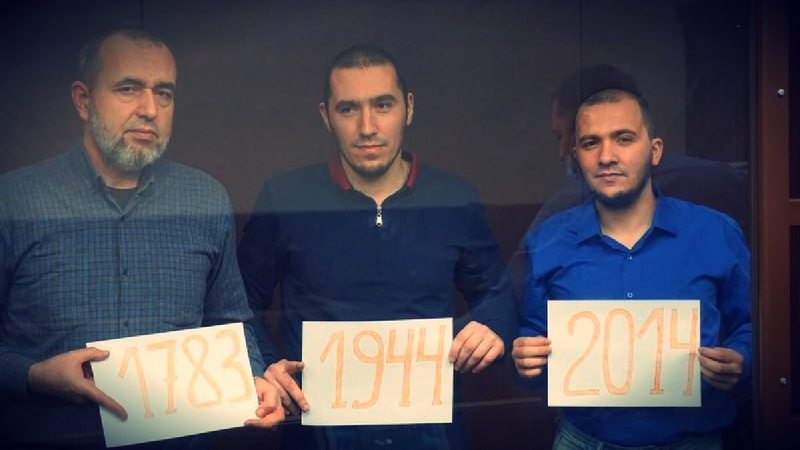
The men were charged with a modern Russian version of the accusation during Stalin’s Terror used as an excuse for executing the two Seitumerov brothers’ great-grandfather. Stalin’s regime called it ‘counter-revolutionary terrorist propaganda’. The Russian occupation regime uses a suspiciously secretive and deeply flawed Supreme Court ruling from 2003 to imprison men on ‘terrorism’ charges without even accusing them of a recognizable crime, let alone coming up with convincing evidence. The ruling declared the peaceful pan-Muslim Hizb ut-Tahrir organization, which is legal in Ukraine and not known to have committed acts of terror anywhere in the world, ‘terrorist’. Russia has been using this ruling, suspect ‘experts’ and so-called ‘secret witnesses’ since 2016 in occupied Crimea as a weapon of repression, especially against Crimean Tatar civic journalists and activists.
Seitumer Seitumerov was charged under the more serious Article 205.5 § 1 of Russia’s criminal code with ‘organizing a Hizb ut-Tahrir group’, while his brother, uncle and Suleimanov were charged with ‘involvement’ in this entirely unproven ‘group’, under Article 205.5 § 2. All of the men were also accused of ‘planning a violent uprising’ (Article 278) although even the FSB admitted that not one of them was suspected of actions or direct plans to commit any action aimed at ‘overthrowing the Russian constitutional order’The three family members were immediately remanded in custody and remain imprisoned to this day. Suleimanov was held under house arrest, ‘attending’ the ‘trial’ via video link from occupied Crimea. The only ‘evidence’ to back the flawed charges were from religious literature which the men’s families all say was planted by the FSB who prevented lawyers from being present; from highly questionable ‘expert assessments’ of illicitly taped conversations in a mosque back in 2017, and two ‘secret witnesses’. The problem with the latter was not only that they appeared unable to distinguish one defendant from another, but that their identity was known, as was the considerable number of similar ‘trials’ where they had been used to convict defendants and get them sentenced to up to 19 years. Konstantin Tumarevich is a fugitive from justice in his native Latvia, and, without the appropriate papers, had every reason to cooperate with the FSB to avoid being deported. The same applies to Nazrulayev Salakhutdin (or Salakhuddin), who did not want to be forcibly returned to Uzbekistan.Russia is using such individuals to justify imprisoning men who have committed no crime for up to 20 years. This is despite a European Court of Human Rights judgement which found that Russia’s dependence on such testimony is a violation of the right to a fair trial and strong criticism from the UN Secretary General.
Despite such flawed charges and non-existent evidence, prosecutor Yevgeny Nadolinsky demanded horrific sentences against all four men, including 13 years in the case of Suleimanov (whom he had previously tried to get remanded in custody). On 29 October 2021, three ‘judges’ from the Southern District Military Court in Rostov (Russia) - Igor Kostin (presiding judge); Roman Plisko and Yevgeny Zviagin – largely obliged, sentencing Seitumer Seitumerov to 17 years; Osman Seitumerov to 14 years; Rustem Seitmemetov to 13 years and Amet Suleimanov to 12 years. All of these sentences are for the worst of Russian penal institutions, with the first 3.5 years to be spent in a prison, the most harsh of all.
It was 100% clear that Suleimanov had essentially been sentenced to death and three other innocent men to huge terms of imprisonment. The sentences were, nonetheless, upheld by ‘judge’ Aleksandr Aleksandrovich Mordovin and two colleagues from the Military Court of Appeal in Vlasikha (Moscow region) on 9 February 2023. It is telling that the penal service, who would normally take a person into custody in the courtroom, chose to await the appeal court ruling coming out in print. It is to be hoped that Serhiy Zayets’ appeal and the UN Committee’s intervention have prevented execution of an effective, and likely immediate, death sentence.
